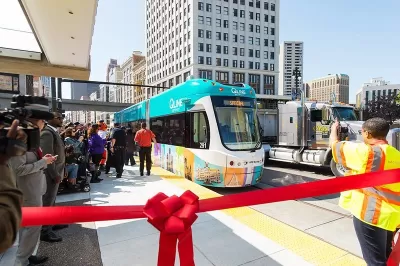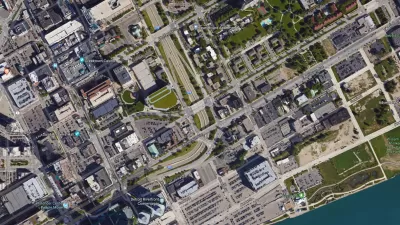John Gallagher takes a look at some of the civic factors and organizations that have worked behind the scenes to pull Detroit through.

Detroit headlines often focus on the major stories: the 2013-2014 bankruptcy, Mayor Mike Duggan, and Dan Gilbert, to name a few. Drawing on 30 years of reporting on Detroit, John Gallagher overviews five "less-noticed trends" that he sees as essential to the city's rebirth.
- A burgeoning urban farming movement, "neighborhood-based, staffed by volunteers," has given "Detroit that first flavor of the reinvention it now enjoys. From the international symbol of Rust Belt ruin, Detroit now evokes the possibilities of a reimagined post-industrial city."
- By spinning off certain municipal services to alternative management, Detroit gave a "host of services once run so badly by the city the freedom to reinvent themselves under new management."
- Entrepreneurialism has upended the Motor City's reputation as an economy dominated by giant corporations.
- Philanthropic organizations have played a major role, "From the more than $300 million pumped into the “Grand Bargain” during Detroit’s bankruptcy to underwriting the birth of the Qline and many other projects [...]"
- Individual neighborhoods have benefited from nonprofit community development organizations, many of which grew from volunteer block clubs to increasingly professionalized entities.
FULL STORY: 30 years covering Detroit: My take on the Motor City's comeback

Planetizen Federal Action Tracker
A weekly monitor of how Trump’s orders and actions are impacting planners and planning in America.

Restaurant Patios Were a Pandemic Win — Why Were They so Hard to Keep?
Social distancing requirements and changes in travel patterns prompted cities to pilot new uses for street and sidewalk space. Then it got complicated.

Maui's Vacation Rental Debate Turns Ugly
Verbal attacks, misinformation campaigns and fistfights plague a high-stakes debate to convert thousands of vacation rentals into long-term housing.

In California Battle of Housing vs. Environment, Housing Just Won
A new state law significantly limits the power of CEQA, an environmental review law that served as a powerful tool for blocking new development.

Boulder Eliminates Parking Minimums Citywide
Officials estimate the cost of building a single underground parking space at up to $100,000.

Orange County, Florida Adopts Largest US “Sprawl Repair” Code
The ‘Orange Code’ seeks to rectify decades of sprawl-inducing, car-oriented development.
Urban Design for Planners 1: Software Tools
This six-course series explores essential urban design concepts using open source software and equips planners with the tools they need to participate fully in the urban design process.
Planning for Universal Design
Learn the tools for implementing Universal Design in planning regulations.
Heyer Gruel & Associates PA
JM Goldson LLC
Custer County Colorado
City of Camden Redevelopment Agency
City of Astoria
Transportation Research & Education Center (TREC) at Portland State University
Camden Redevelopment Agency
City of Claremont
Municipality of Princeton (NJ)





























